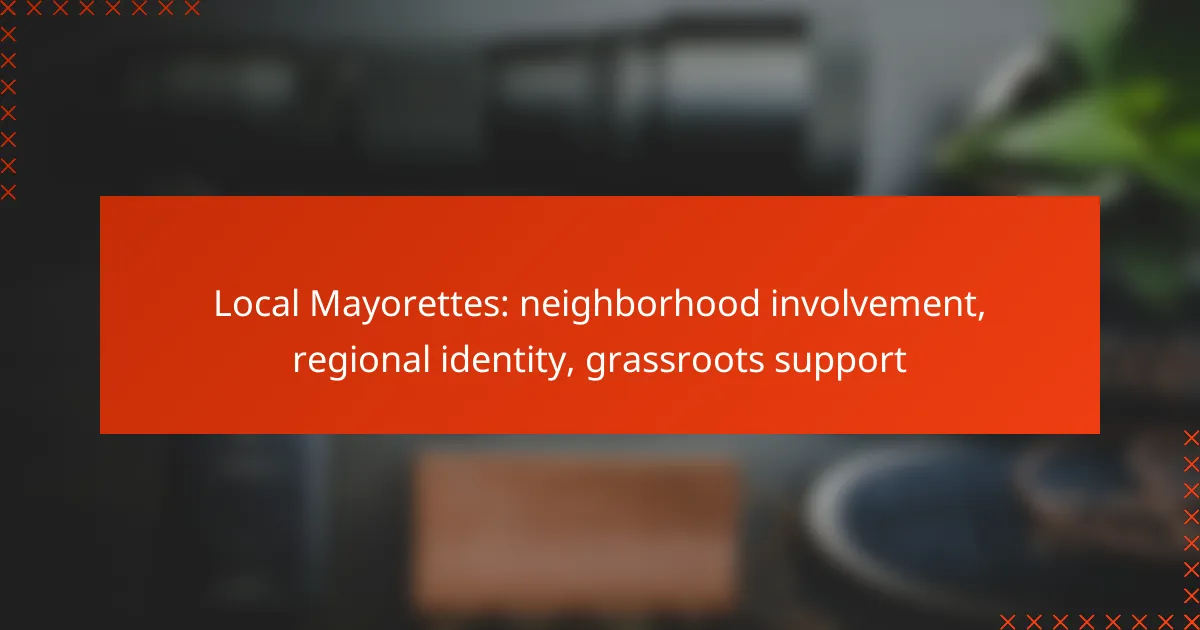Local Mayorettes are essential in strengthening neighborhood involvement and fostering a sense of community in Toronto and beyond. By acting as a liaison between residents and local government, they amplify community voices and enhance civic participation, while also promoting regional identity and local traditions. Their grassroots support is cultivated through effective communication and initiatives that encourage residents to engage actively in their neighborhoods.
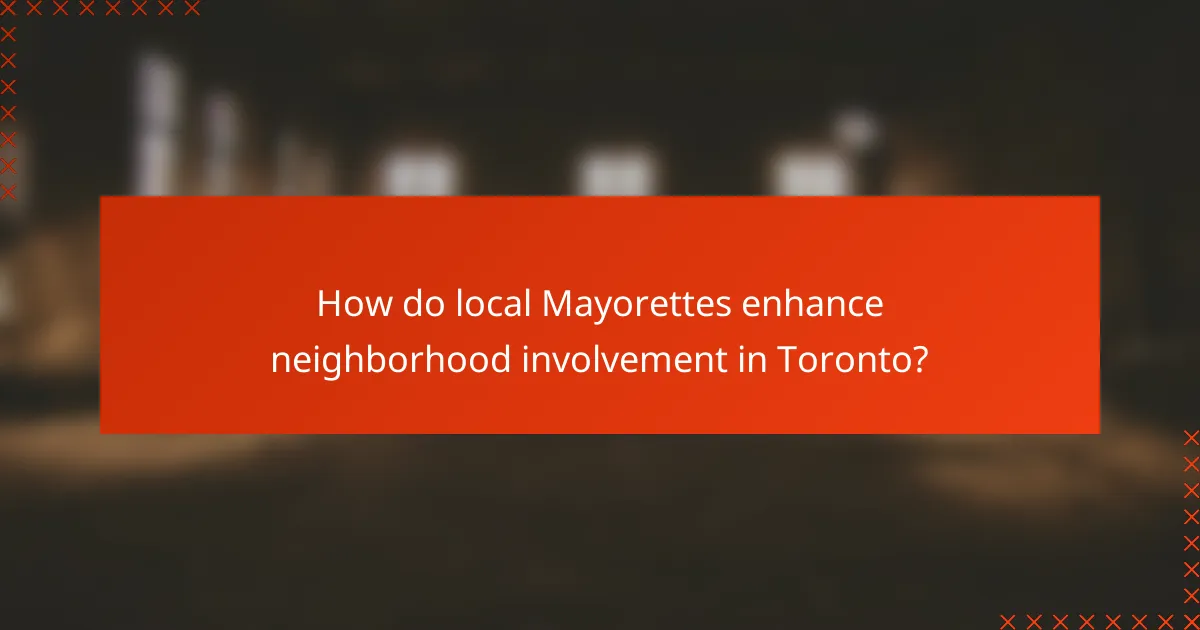
How do local Mayorettes enhance neighborhood involvement in Toronto?
Local Mayorettes play a crucial role in enhancing neighborhood involvement in Toronto by fostering community connections and encouraging civic participation. They serve as a bridge between residents and local government, ensuring that community voices are heard and represented.
Community engagement initiatives
Community engagement initiatives led by local Mayorettes often include town hall meetings, workshops, and neighborhood clean-up days. These events encourage residents to share their ideas and concerns, creating a platform for dialogue and collaboration. By actively involving community members, Mayorettes help build a sense of belonging and ownership over local issues.
Additionally, Mayorettes may implement programs that focus on specific community needs, such as youth mentorship or senior support services. These targeted initiatives can significantly enhance participation and strengthen neighborhood ties.
Support for local events
Local Mayorettes are instrumental in supporting various community events, such as festivals, farmers’ markets, and cultural celebrations. By promoting these events, they help to foster a vibrant local culture and encourage residents to engage with one another. This support can include logistical assistance, funding, or simply raising awareness through social media and community boards.
Moreover, Mayorettes often collaborate with local businesses to sponsor events, creating a win-win situation that boosts local economies while enhancing community spirit.
Partnerships with local organizations
Establishing partnerships with local organizations is a key strategy for Mayorettes to enhance neighborhood involvement. By collaborating with schools, non-profits, and community groups, they can leverage resources and expertise to address local challenges effectively. These partnerships often lead to innovative solutions and greater community impact.
For instance, a Mayorette might partner with a local health organization to host wellness fairs, providing residents with valuable health resources and information. Such collaborations not only address immediate community needs but also foster long-term relationships among residents and organizations.
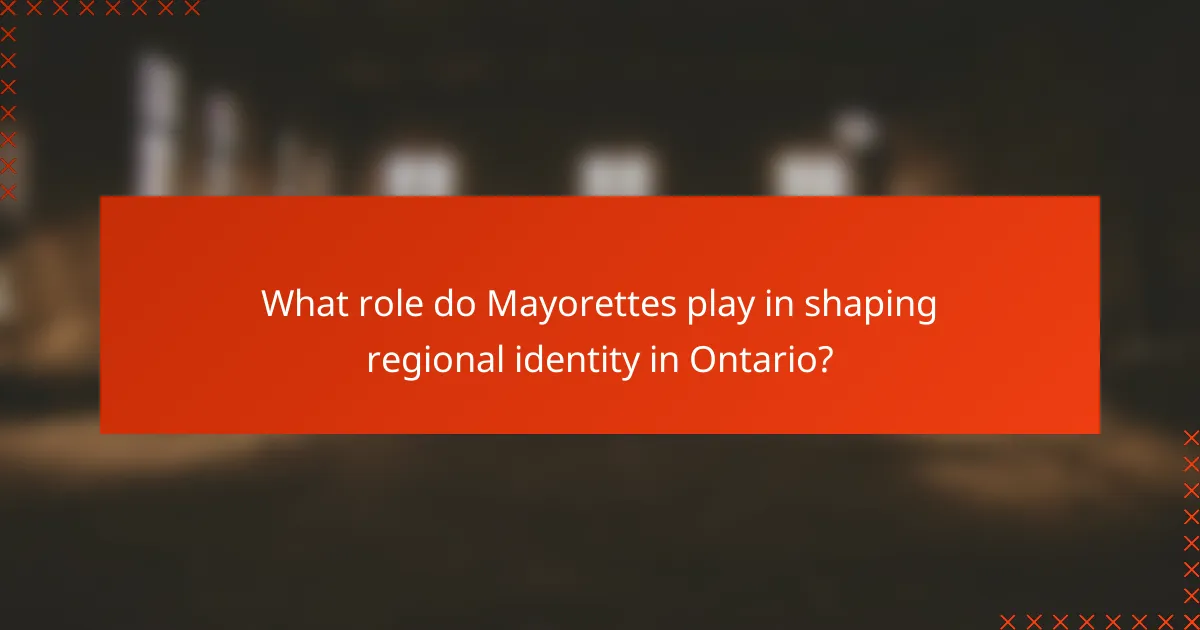
What role do Mayorettes play in shaping regional identity in Ontario?
Mayorettes in Ontario significantly influence regional identity by fostering community engagement and promoting local traditions. They serve as vital connectors between residents and local governance, enhancing civic pride and participation.
Promotion of local culture
Mayorettes actively promote local culture by organizing events that celebrate regional heritage, such as festivals, parades, and art exhibitions. These activities not only showcase local talent but also encourage residents to engage with their cultural roots.
For example, a Mayorette might coordinate a summer festival featuring local musicians and artisans, drawing visitors from surrounding areas and boosting local businesses. This cultural promotion helps to solidify a sense of belonging among community members.
Representation of community values
Mayorettes represent community values by advocating for issues that matter to residents, such as environmental sustainability, public safety, and social equity. They often serve as a voice for marginalized groups, ensuring diverse perspectives are included in local decision-making.
By participating in town hall meetings and community forums, Mayorettes can influence policies that reflect the priorities of their neighborhoods. Their grassroots support helps to create a more inclusive and representative local government.
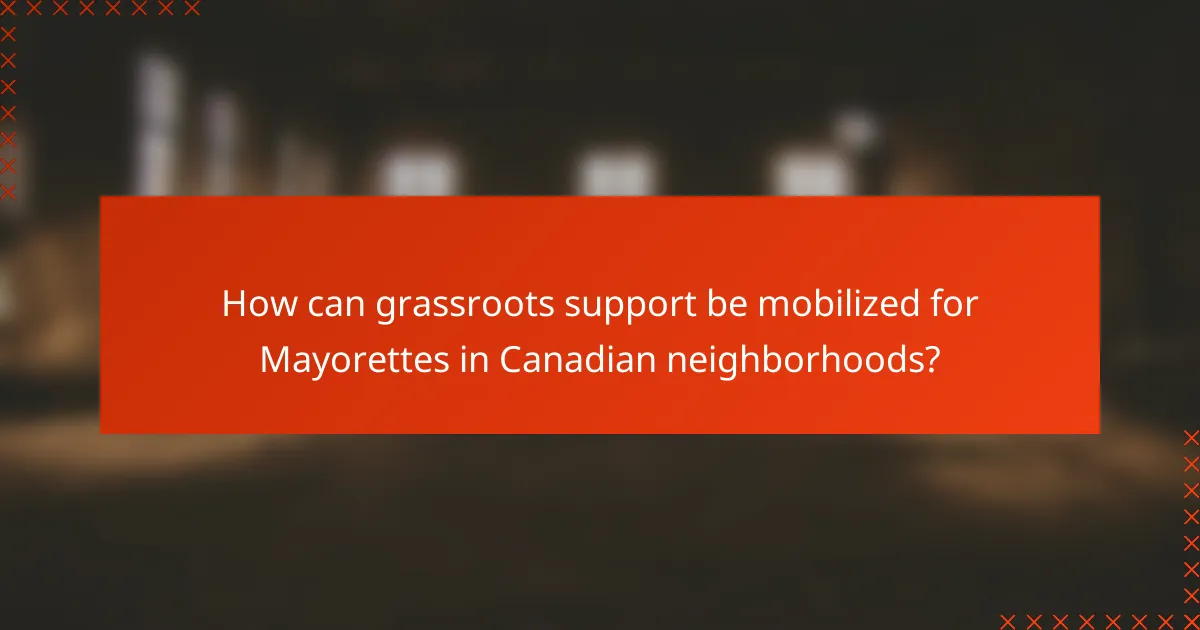
How can grassroots support be mobilized for Mayorettes in Canadian neighborhoods?
Grassroots support for Mayorettes in Canadian neighborhoods can be mobilized through community engagement, effective communication, and local initiatives. By fostering a sense of belonging and identity, residents are more likely to participate in activities that promote their local leaders.
Volunteer recruitment strategies
Effective volunteer recruitment strategies include hosting community events and informational sessions to raise awareness about the role of Mayorettes. Engaging local schools, community centers, and organizations can help identify potential volunteers who are passionate about neighborhood involvement.
Consider creating a volunteer database to track interested individuals and their skills. This allows for targeted outreach and ensures that volunteers are matched with roles that suit their strengths, enhancing overall engagement.
Social media campaigns
Social media campaigns can significantly amplify grassroots support for Mayorettes by reaching a broader audience. Platforms like Facebook, Instagram, and Twitter can be utilized to share success stories, upcoming events, and volunteer opportunities, creating a vibrant online community.
Engaging content, such as videos and testimonials from local residents, can foster a sense of connection. Regular updates and interactive posts encourage participation and keep the community informed about the Mayorettes’ initiatives.
Local fundraising efforts
Local fundraising efforts are crucial for sustaining grassroots support for Mayorettes. Organizing community events like bake sales, car washes, or charity runs can generate funds while simultaneously raising awareness about the Mayorettes’ work.
Additionally, consider establishing partnerships with local businesses for sponsorships or donations. This not only provides financial support but also strengthens community ties and encourages local investment in the Mayorettes’ initiatives.

What are the key criteria for selecting a Mayorette in Canada?
The selection of a Mayorette in Canada typically hinges on community engagement, leadership abilities, and a demonstrated commitment to local issues. Candidates should have a strong connection to their neighborhoods and a track record of fostering grassroots support.
Community involvement history
A Mayorette should have a solid history of community involvement, which often includes participation in local events, volunteer work, and engagement with neighborhood organizations. This background helps build trust and credibility among residents.
Potential candidates may showcase their community involvement through initiatives like organizing local clean-ups, participating in school boards, or leading neighborhood watch programs. These activities not only highlight their dedication but also reflect their understanding of community needs.
Leadership skills
Effective leadership skills are crucial for a Mayorette, as they must inspire and mobilize residents towards common goals. Strong communication, conflict resolution, and decision-making abilities are essential traits for any candidate.
Candidates should demonstrate their leadership through previous roles, such as chairing community meetings or leading local advocacy efforts. Engaging with diverse groups and addressing various perspectives can further enhance their leadership profile, making them more appealing to voters.
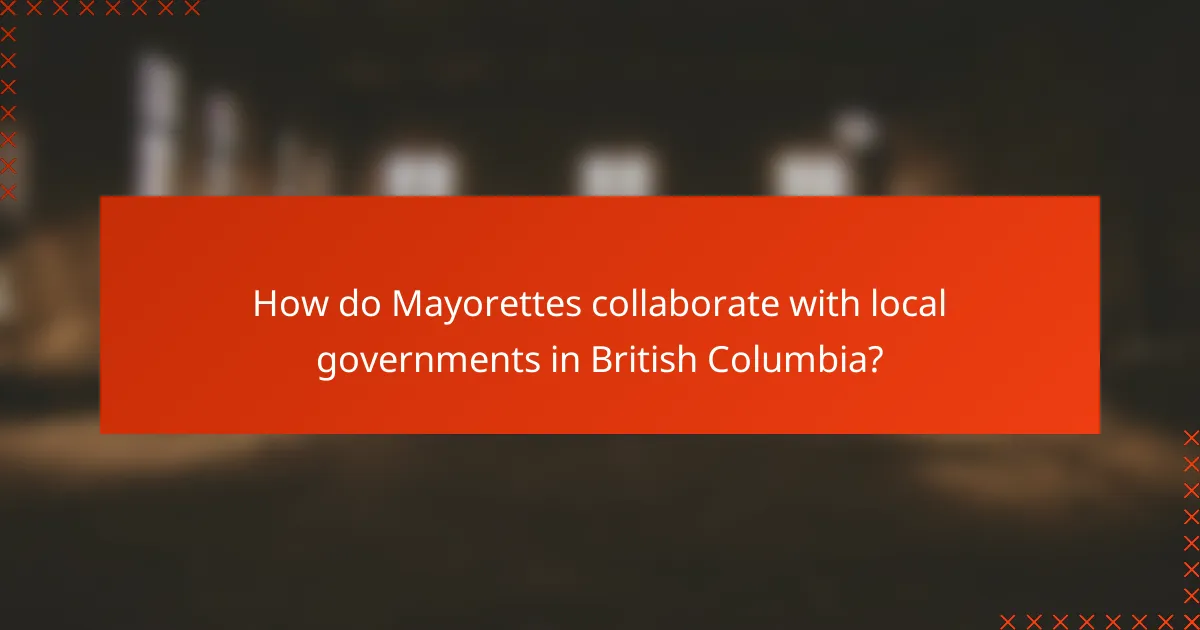
How do Mayorettes collaborate with local governments in British Columbia?
Mayorettes in British Columbia work closely with local governments to enhance community engagement and address regional issues. Their collaboration often focuses on policy advocacy and joint community projects that reflect the needs and identity of their neighborhoods.
Policy advocacy
Mayorettes play a crucial role in policy advocacy by representing the interests of their communities to local government officials. They often gather feedback from residents and present it to decision-makers, ensuring that local policies align with community needs.
For effective advocacy, Mayorettes should prioritize key issues that resonate with their constituents, such as housing, public safety, and environmental sustainability. Engaging with local councils and attending public meetings can amplify their voices and influence policy changes.
Joint community projects
Joint community projects between Mayorettes and local governments foster a sense of regional identity and strengthen grassroots support. These initiatives can range from neighborhood clean-up days to cultural festivals that celebrate local heritage.
To initiate successful projects, Mayorettes should assess community interests and collaborate with local agencies. Establishing clear goals, timelines, and budgets will help ensure that projects are well-organized and effectively address community needs. Examples include creating community gardens or organizing youth mentorship programs that engage residents and promote local pride.

What challenges do Mayorettes face in their roles?
Mayorettes encounter various challenges that can hinder their effectiveness in fostering community involvement and regional identity. Key issues include funding limitations and community resistance, both of which can significantly impact their ability to implement grassroots initiatives.
Funding limitations
Funding limitations are a significant challenge for Mayorettes, as they often rely on local government budgets and community donations to support their initiatives. Many mayorettes operate with tight budgets, which can restrict their capacity to organize events or provide services that enhance neighborhood engagement.
To navigate funding challenges, Mayorettes can explore alternative funding sources such as grants, partnerships with local businesses, or crowdfunding campaigns. Establishing a clear budget and prioritizing essential projects can help maximize the impact of available resources.
Community resistance
Community resistance can manifest in various forms, including skepticism towards new initiatives or reluctance to participate in local governance. This resistance may stem from a lack of awareness about the role of Mayorettes or previous negative experiences with local leadership.
To address community resistance, Mayorettes should focus on building trust through transparent communication and active listening. Engaging residents in decision-making processes and showcasing the benefits of proposed initiatives can help foster a more supportive environment for grassroots efforts.

What are the benefits of having Mayorettes in local governance?
Mayorettes play a crucial role in local governance by fostering community engagement and enhancing regional identity. Their involvement leads to stronger grassroots support, which can significantly improve the effectiveness of local initiatives.
Increased community trust
Having Mayorettes in local governance can significantly boost community trust. They often serve as relatable figures who understand local issues, making residents feel more connected to the decision-making process.
When Mayorettes actively engage with their neighborhoods, they create transparency in governance. This openness can lead to higher levels of trust, as residents see their concerns being addressed directly and effectively.
Enhanced civic participation
Mayorettes encourage enhanced civic participation by mobilizing residents to take part in local events and initiatives. Their grassroots approach often leads to increased attendance at community meetings and local activities.
By organizing workshops, forums, and volunteer opportunities, Mayorettes can inspire residents to become more involved in civic life. This participation not only strengthens community bonds but also empowers individuals to voice their opinions and contribute to local governance.
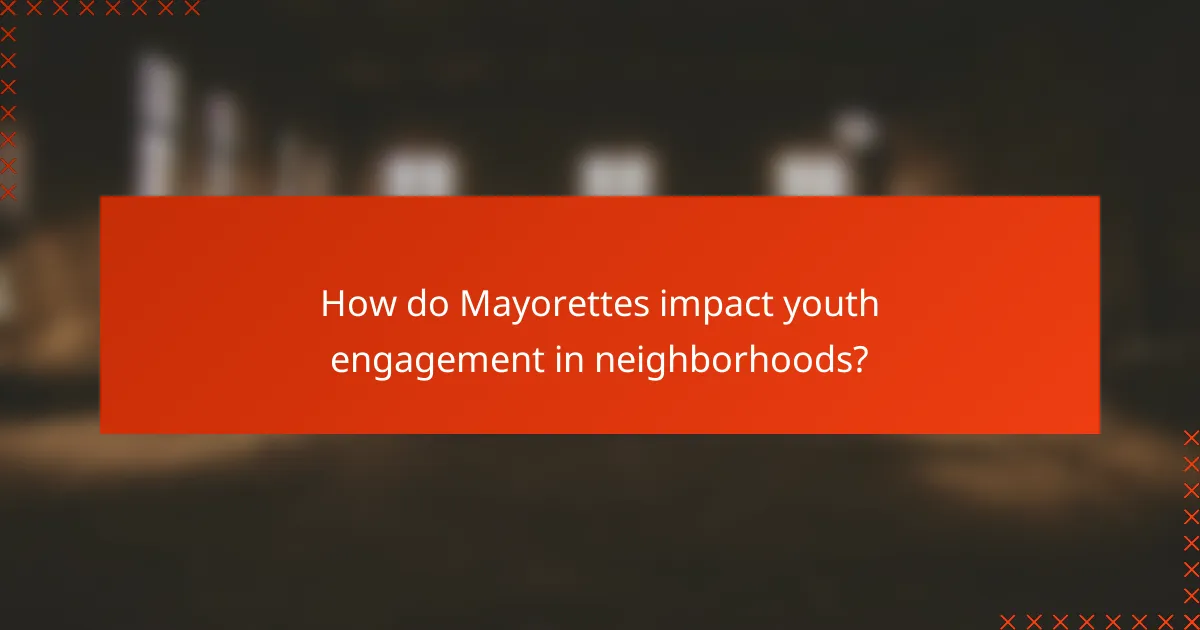
How do Mayorettes impact youth engagement in neighborhoods?
Mayorettes play a crucial role in fostering youth engagement within neighborhoods by creating inclusive spaces for young people to participate in community activities. They often serve as role models and advocates, encouraging local youth to take an active interest in their surroundings and contribute to community development.
Building Community Connections
Mayorettes facilitate connections among youth by organizing events such as community clean-ups, sports tournaments, and cultural festivals. These activities not only promote teamwork but also help young people develop a sense of belonging and pride in their neighborhood. By engaging with local organizations, Mayorettes can also provide resources and mentorship opportunities for youth.
Encouraging Civic Participation
Mayorettes encourage civic participation among youth by involving them in local decision-making processes. This can include youth councils or forums where young people can voice their opinions on community issues. Such involvement fosters a sense of responsibility and empowers youth to advocate for changes that benefit their neighborhoods.
Promoting Leadership Skills
Through various initiatives, Mayorettes help youth develop essential leadership skills. Workshops, public speaking events, and volunteer opportunities allow young people to practice and enhance their abilities. These experiences not only build confidence but also prepare them for future roles in community leadership and civic engagement.
